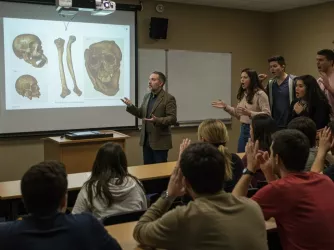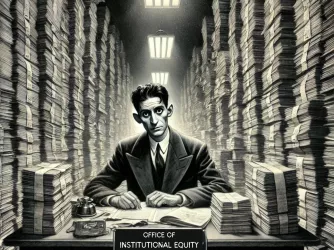Table of Contents
Linfield University finally drops bogus investigation of professor who still doesn’t know the allegations against her

Linfield University dropped its investigation into Professor Reshmi Dutt-Ballerstadt (pictured) for her social media posts that praised English majors and criticized the business school’s takeover of the building housing the English department. (Photo courtesy Professor Dutt-Ballerstadt)
Almost a month after Linfield University launched an investigation into English professor Reshmi Dutt-Ballerstadt, the university says the investigation is over and that it will take no further action. Dutt-Ballerstadt, however, still doesn’t know the university’s justification for investigating her.
The welcome development in this vexing case comes less than a week after the American Association of University Professors released a report calling the conditions of academic freedom and shared governance at Linfield “deplorable,” and following two letters and continuous criticism from FIRE for violating faculty expressive and due process rights. Although Linfield is a private university and is thus not obligated to promise faculty freedom of speech, the university has made clear commitments to faculty that they enjoy expressive freedoms. Having made these promises, Linfield must uphold expressive rights.
Linfield has proven itself a truly bad actor when it comes to respecting faculty’s expressive and due process rights.
As FIRE previously reported, Linfield told Dutt-Ballerstadt an outside entity would investigate her after she made social media posts noting tension between Linfield’s English department and business school that resulted in complaints to the university. After FIRE criticized the unwarranted investigation into clearly protected speech, Linfield’s outside counsel claimed there was more to the matter, but refused to share any additional information about the basic nature of the allegations with either FIRE or Dutt-Ballerstadt herself, citing Linfield’s asserted concerns for the complainant’s privacy.
Linfield failed to respond to FIRE’s follow-up letter explaining that, to comport with the most basic conception of due process, it must provide Dutt-Ballerstadt notice of what she allegedly did.
Yesterday, amid fallout from the AAUP report, Linfield informed Dutt-Ballerstadt that she’s no longer under investigation — but still won’t tell her the basis for the investigation in the first place. In its original notice, the university said it was investigating “a series of events … in TJ Hall” and “on social media that were unprofessional.” In its letter to Dutt-Ballerstadt yesterday, the university changed its story, saying it received complaints that she created a hostile work environment.
We’re glad Linfield backed off. But its significant violations of core tenets of free speech and due process — opening an investigation into a professor’s clearly protected speech, noting her “participation will be required,” and all the while refusing to tell her the reasons for the investigation so she might prepare a defense to any misconduct charges — are unacceptable.
This situation, along with previous denials of due process and expressive freedom, certainly chilled faculty expression at Linfield, and will continue to do so until it publicly recommits to respecting faculty rights.
The AAUP’s recent report detailed Linfield’s failings in its firing of tenured professor Daniel Pollack-Pelzner without due process for comments critical of the university. The report said Linfield has an eroding system of shared governance, “which has jeopardized the faculty’s exercise of academic freedom and contributed to a culture of abuse.”
In June, the AAUP will vote on whether to recommend adding Linfield to its infamous list of censured administrations. This year, FIRE added Linfield to our own list: the 10 Worst Colleges for Free Speech.
Linfield has proven itself a truly bad actor when it comes to respecting faculty’s expressive and due process rights. FIRE will continue to fight back against the university’s misdeeds until faculty there can be confident Linfield will keep the important promises it makes.
FIRE defends the rights of students and faculty members — no matter their views — at public and private universities and colleges in the United States. If you are a student or a faculty member facing investigation or punishment for your speech, submit your case to FIRE today. If you’re faculty member at a public college or university, call the Faculty Legal Defense Fund 24-hour hotline at 254-500-FLDF (3533). If you’re a college journalist facing censorship or a media law question, call the Student Press Freedom Initiative 24-hour hotline at 717-734-SPFI (7734).
Recent Articles
FIRE’s award-winning Newsdesk covers the free speech news you need to stay informed.

UPDATE: Another federal appeals court backs academic free speech for public employees

Feds to Columbia: ‘You want $400 million in contracts back? Do this (or else)’

A picture is worth a thousand words — unless a college district bans it
